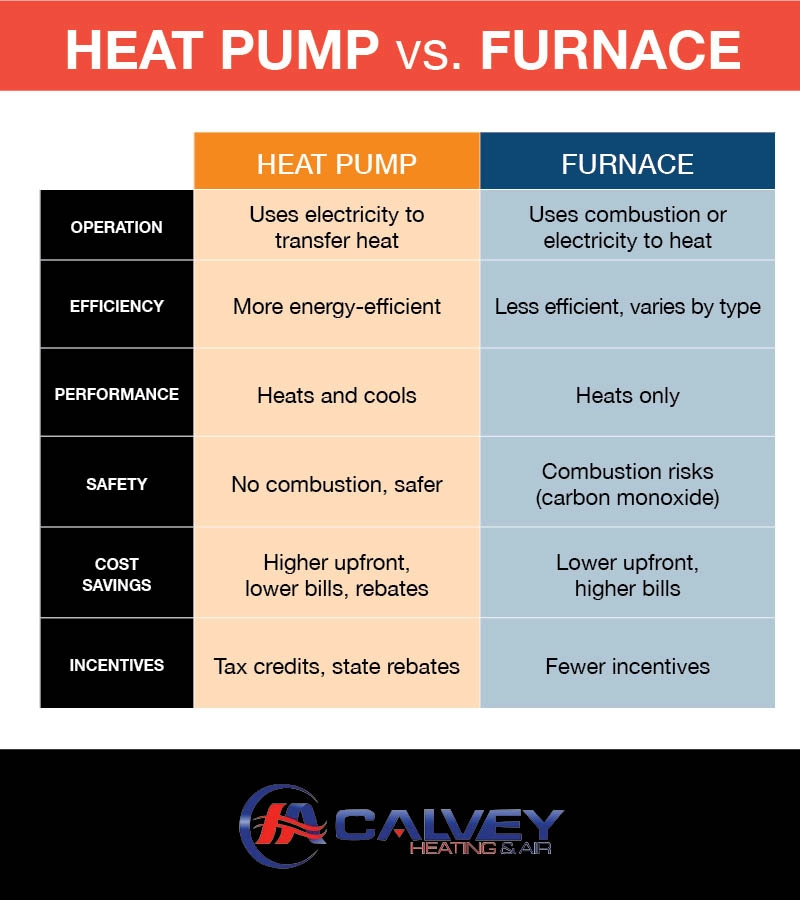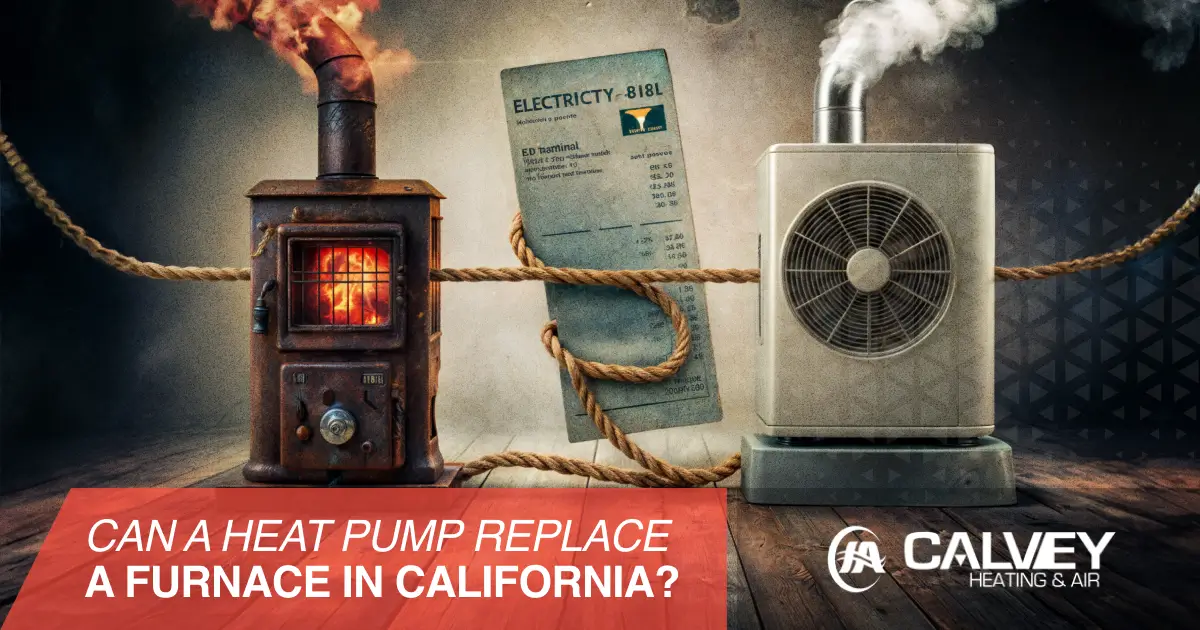With potential for improved energy efficiency, performance, cost savings, and other advantages, heat pumps are an increasingly popular HVAC option for homeowners in California and other areas. However, each home is unique and it’s important to explore all the factors when deciding whether to replace your furnace with a heat pump. At Calvey Heating and Air, our team can help customize an HVAC solution to optimize comfort and convenience.
Heat Pump vs. Furnace

While heat pumps and furnaces serve the same purpose, they carry some key operational differences.
What is a heat pump?
A heat pump is a type of HVAC unit that uses electricity to extract and transfer heat from the outdoor air, even in cold temperatures. These units use refrigerant cycle principles to extract and transfer heat but can work in either direction — in other words, they can heat your home in the winter and cool it in the summer.
There are several types of heat pumps:
- Air source heat pumps: These are common units that collect and transfer heat from outside. They use ductwork to distribute air throughout your home.
- Ductless mini-split: Typically featuring one outdoor unit that gathers heat and transfers it via refrigeration lines to indoor units, mini-splits don’t need ductwork to heat your home.
- Geothermal heat pumps: Also known as ground source heat pumps, these units extract heat from underground and deliver it to your home.
What is a furnace?
Furnaces are forced air heating systems available in combustion types, such as natural gas, oil, or propane, and electric types. Rather than combustion-generated heat, electric furnaces use resistance heating elements. These units have heat exchangers, blower motors, and other components that heat and distribute warm air throughout your home.
Advantages of Replacing a Furnace with a Heat Pump
Replacing a furnace with a heat pump can offer several advantages, including enhanced energy efficiency, convenience, and comfort.
Energy efficiency
Heat pumps are an energy-efficient alternative to most furnaces and air conditioners. Compared to electric furnaces, heat pumps consume approximately 65% less electricity. While the comparison between heat pumps and combustion-based furnaces is more nuanced, heat pumps typically consume less electricity to match or exceed the performance of a furnace using an equivalent amount of fuel.
Performance
Most of a heat pump’s energy efficiency comes from its superior ability to maintain a comfortable temperature and humidity level in your home. These systems can run continuously but at low output when necessary, resulting in consistent temperatures compared to the on-and-off cycle of a furnace.
All-in-one system
Many furnaces remain dormant throughout most of the year when your home instead relies on cooling from your air conditioner. Heat pumps can provide both heating and cooling, enhancing the comfort, versatility, and efficiency of your home without requiring separate units or systems.
Safety
While well-maintained furnaces are generally safe and reliable, some breakdowns can cause safety issues from combustion processes, such as carbon monoxide leaks or air pollutants. Since they don’t use combustion, heat pumps don’t pose these safety risks. Many units also feature advanced technology that helps filter and purify your home’s indoor air.
Cost savings
While the upfront cost of a heat pump or mini-split system may be higher than a furnace, they offer significant long-term saving potential. Between lower utility bills, reduced maintenance costs, tax rebates, and other factors, heat pumps can be a more cost-effective option than furnaces.
Climate Considerations in California
California hosts a diverse range of climates, with Mediterranean-like coastal areas, arid desert regions, and even alpine tundra. These climates and their seasonal shifts can affect the suitability of a heat pump system for your home.
Coastal
Los Angeles, San Francisco, and other coastal cities and areas experience moderate year-round temperatures with warm and dry summers and cool and wet winters. Since heat pumps tend to lose performance in more extreme temperature ranges, these areas are ideal for maximizing efficiency.
Inland
Inland regions, such as counties surrounding the Sierra Nevada mountains and in the Sacramento area, often see more continental weather. South Lake Tahoe, Redding, and other pockets tend to see more extreme summer and winter temperatures, but most inland California areas are still suitably matched to heat pumps. Homeowners in these areas may consider heat pumps specifically designed for colder climates.
Desert
Death Valley, Palm Springs, and other desert regions may slightly reduce heat pump efficiency during peak cooling months. Even so, they provide effective cooling in extreme summer temperatures and are well-equipped for the rest of the year’s temperatures.
Cost Considerations for Replacing Furnace With a Heat Pump
Replacing your furnace with a heat pump offers many advantages, but it’s important to consider the cost implications before committing to a new system.
Upfront investment
Heat pump installations generally have a higher upfront investment than a new furnace, particularly if you opt for a higher-end model or need several mini-split indoor units. Upfront expense also depends on the unit’s size, capacity, and manufacturer as well as your location and labor costs.
The long-term savings opportunities of heat pumps can offset the installation costs, but other factors can also justify the investment. Aging HVAC units become prone to more frequent and significant breakdowns and may incur high repair costs. If your current furnace, air conditioner, or entire system is nearing the end of its lifespan or requires frequent repairs, a heat pump can be a cost-effective all-in-one replacement.
Operational costs
Heat pumps typically have lower operational costs and can lower your utility bills. This is especially true in areas with moderate climates, such as coastal California.
Maintenance
Heat pumps and furnaces both require preventive maintenance to keep them operating smoothly. Furnaces sometimes have higher lifetime costs as they may have higher maintenance and repair needs.
Lifespan
Heat pumps and furnaces have similar lifespan projects, but their longevity depends on usage, system capacity, installation quality, climate, and other factors. Opting for a high-quality heat pump and scheduling regular maintenance can help prolong its life span.
Incentives and rebates
Rebates and incentives are one of the biggest perks for a heat pump installation. California residents may qualify for cost savings through several programs, such as:
- Federal tax credit: The Inflation Reduction Act offers up to $2,000 in credits for heat pump installations.
- TECH Clean California: This statewide initiative provides heat pump rebates for eligible homeowners.
- California utility company: Some utility companies offer savings when you upgrade to energy-efficient equipment.
Installation and Compatibility
The benefits of replacing a furnace with a heat pump also depend on installation and compatibility factors, such as:
- Ductwork: A heat pump can use the existing ductwork in your home, but it may require upgrades or modifications to accommodate the new unit. Mini-splits are available for ductless installations but may have higher upfront costs.
- Sizing and capacity: Proper sizing and capacity is essential for efficient heat pump performance. An HVAC technician can assess your home to determine a customized solution.
- Electrical requirements: Ensure that your home’s electrical system can handle the load of a heat pump. You may need electrical upgrades to accommodate the new unit.
- Zoning: Heat pump systems sometimes feature zoning capabilities. Work with an HVAC technician to plan and integrate these controls into your home to optimize comfort and efficiency.
Call Calvey Heating and Air for Heat Pump Installation in California
Family-owned and operated, Calvey Heating and Air and our team of licensed HVAC technicians provides expert installation, maintenance, and repair services. Serving San Jose and other California areas, our customers recognize us for reliable and quality workmanship. Contact us today for a free estimate and to schedule a service with Calvey Heating and Air.


